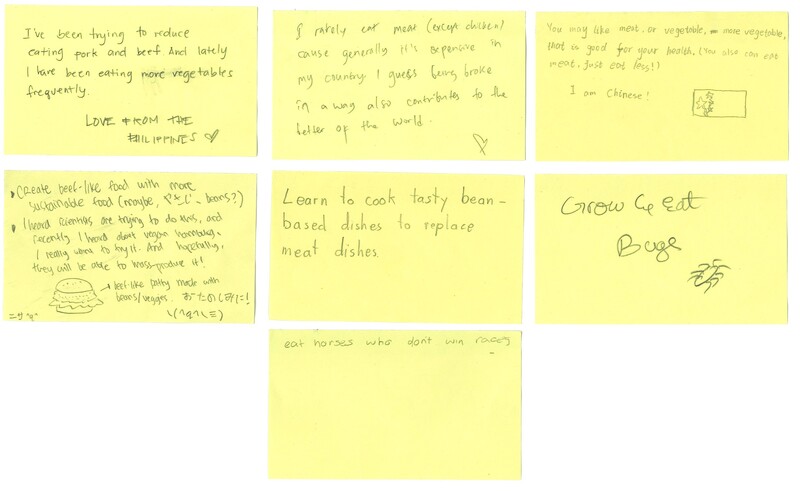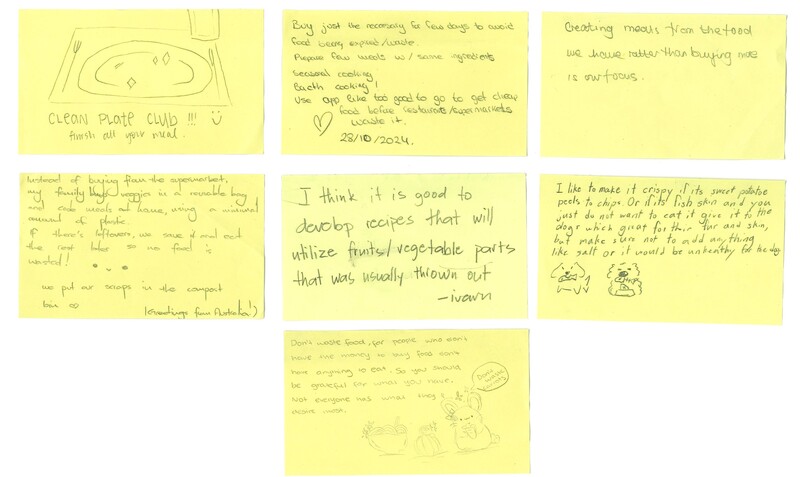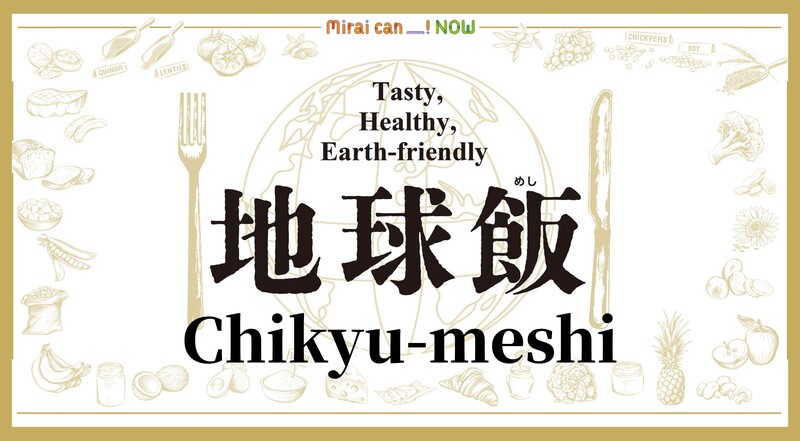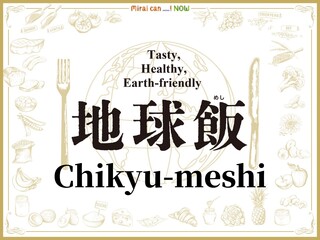The food we eat every day is putting a burden on the environment and people in many ways, and we must not go on this way. To solve this problem, we proposed eating sustainable food that is good for the environment and people, which we named “Chikyu-meshi” (literally: Earth food), in the temporary exhibition “Chikyu-meshi - Tasty, Healthy, Earth-friendly” at Miraikan, from September to December 2024. In this blog, I will introduce comments and ideas from people who visited the “Chikyu-meshi” exhibition.
For those of you who are wondering what “Chikyu-meshi” is or why it is necessary, please refer to part 1 of this blog, “Let’s eat ‘Chikyu-meshi’!”.
For some recipes for “Chikyu-meshi”, please refer to part 2: Let’s make “Chikyu-meshi”!
Like Koh Kentetsu’s recipe in part 2 of this blog, making things easier for yourself can go hand in hand with being environmentally friendly. On the other hand, focusing on one strategy, such as “food loss-less”, while also respecting your own preferences like Akari Hasegawa is another possibility.
I imagine you have your own thoughts, ideas and values when it comes to food. That is why we asked visitors to the “Chikyu-meshi” exhibition: “What can you do to turn your usual meals into ‘Chikyu-meshi’? Plus, please also tell us what you think is important when doing so!” Over 1800 people gave their opinions, amongst which some were in English. And it seems like many of you are already practicing the principles of “Chikyu-meshi”!
There were so many interesting comments and ideas that I had a hard time selecting them, so even after choosing only the ones I liked best, there still are a lot. Feel free to just browse to see if there are any that pique your interest. Just enjoy reading as many as you can. I grouped them according to the main strategies of “protein shift” and “food loss-less”, and then there were also a couple of other ideas.
Protein shift

Compared to the Japanese comments, there were many people who shared their thoughts on “protein shift” amongst those who commented in English. Maybe there is more attention for this in the English-speaking world? Or perhaps it reflects traditional Japanese food culture? Tofu and other plant-based protein sources have long since been common in Japanese cuisine, so perhaps Japanese people feel like they are already eating many low-impact proteins.
Whatever the reason, many people shared their experiences on shifting towards protein sources with less impact on the environment and our health. Here are some examples.
I’ve been trying to reduce eating pork and beef. And lately I have been eating more vegetables frequently.
Love from the Philippines.
This person is doing their best to reduce their intake of meat types that have a high impact on the environment and our health. Reducing meat consumption in favor of vegetables is something many people mentioned.
I rarely eat meat (except chicken) ’cause generally it’s expensive in my country. I guess being broke in a way also contributes to the better of the world.
Meat does indeed tend to be more expensive than other foods, while chicken is relatively inexpensive compared to other meat – at least that seems to be the case in both my home country (The Netherlands) and here in Japan. In that sense, protein shift and saving money are matched really well.
You may like meat, or vegetable, more vegetable, that is good for your health. (You also can eat meat, just eat less!)
I am Chinese!
Of course, your personal likes and dislikes are also important. And as this person mentions: there is no need to become entirely vegetarian. Just eating less meat can already make the difference. An example of this would be the Planetary Health Diet, which mainly depends on plant-based products as protein sources but also includes animal-based protein such as meat and eggs.
There were also some ideas for new products or learning new skills, like the ones below.
- Create beef-like food with more sustainable food (maybe やさい [=vegetables], beans?)
- I heard scientists are trying to do this, and recently I heard about vegan hamburg [=hamburger]. I really want to try it. And hopefully, they will be able to mass-produce it!
→ beef-like patty made with beans/veggies. おたのしみに![=looking forward to it!]
Up until now, I have tried a number of plant-based meats, and often they can hardly be distinguished from ‘real’ hamburgers or meatballs... They are still not very common in supermarkets in Japan, so I share this person’s sense of anticipation!
Learn to cook tasty bean-based dishes to replace meat dishes
Beans are indeed good sources of protein! I often make a Mexican-inspired dish with beans, tomatoes and a bunch of other vegetables (whatever I feel like on that day; I often use pumpkin, onion, corn, green peas and carrots) and a variety of spices (chili pepper, garlic and paprika powder are a must!). It goes well with potato chips or tortilla chips.
Grow & eat bugs
Insects and other bugs generally have a lower environmental impact than mammals and birds, so they are also a way to do protein shift! I don’t see them around that much yet, but we do have some bug-based products at Miraikan’s gift shop for everyone who wants to give eating insects a try.
Eat horses who don’t win races
Well, this is an interesting one... I think this particular idea can lead to heated discussions with horse lovers, but eating meat from animals that were not (solely) raised for consumption purposes can have a lower environmental impact. For example, in the Netherlands I have seen chicken meat from a breed that is mainly used for their eggs being sold. Half of those birds are roosters that don’t lay eggs anyway, and chickens that are finished laying eggs still have meat as well. Eating their meat will have less environmental impact than sending them to the trash bin and at the same time raising other chickens solely for their meat.
Food loss-less

CLEAN PLATE CLUB!!! :)
Finish all your meal.
Eating everything on your plate is something everyone can do to reduce food loss. Of course, to not only protect the environment but also your own health, make sure the amount of food on your plate also matches your appetite and body size!
Buy just the neccesary for few days to avoid food being expired/waste.
Prepare few meals w/ same ingredients.
Seasonal cooking
Batch cooking!
Use app like too good to go to get cheap food before restaurants/supermarkets waste it.
28/10/2024
Creating meals from the food we have rather than buying more is our focus.
I guess the next steps to make your meals more like “Chikyu-meshi” – although in terms of time it would be the step before finishing your meals – would be something like this. Being smart about what and how much you buy and first using things you already have can prevent a lot of food waste! You may even end up saving money along the way.
Instead of buying from the supermarket, my family buys veggies in a reusable bag and cook meals at home, using a minimal amount of plastic.
If there’s leftovers, we save it and eat the rest later so no food is wasted!
We put scraps in the compost bin ♡
(Greetings from Australia!)
It looks like these people are going all out! By the way, this comment made me realize that even if you don’t finish everything you cooked or everything on your plate at once, eating it later is also an option. And although the food itself has the highest environmental impact, the plastic that often comes with it is not exactly environmentally friendly either, so reducing the amount of plastic you use can also help to make your meals more like “Chikyu-meshi”.
I think it is good to develop recipes that will utilize fruits/vegetable parts that was usually thrown out.
Often more parts of fruits or vegetables can be eaten than you realize, so I definitely agree that recipes for traditionally unused edible parts would be good! For example, there is a Japanese side dish called “kinpira” which can be made using the skins of vegetables that you might otherwise throw away. And the next person also has some concrete ideas on how to use parts that are usually thrown away:
I like to make it crispy, if its sweet potatoe peels to chips. Or if its fish skin and you just do not want to eat it give it to the dogs which great for their fur and skin, but make sure not to add anything like salt or it would be unhealthy for the dog.
I would like to try those chips! Other than that, since I am not a vet so I don’t know whether the claims about dogs are right; if you want to try, do so at your own risk.
Don’t waste food, for people who don’t have the money to buy food don’t have anything to eat. So you should be grateful for what you have. Not everyone has what they desire most.
Don’t waste carrots. [cute bunny drawing]
This is also really important! Wasting (parts of) your food or not is a choice you can make, and not everyone is lucky enough to have that choice.
Other ideas

Reduce meat intake and consume more local produce instead.
Aside from protein shift, this person also thinks about the environmental impact of food transport; very nice. The impact of production is usually higher than that of transport, so they got the order right as well.
Eating seasonal food, especially fruits and vegetables, is delicious and good for the environment.
Indeed, eating seasonal food is another strategy that can help you make your food more like “Chikyu-meshi”. Out-of-season food often comes from greenhouses that use a lot of energy for heating or from the other side of the Earth since the seasons on the north and south are opposite. Seasonal food can usually be produced locally and without heated greenhouses.
I like cucumbers and try to eat veggies from my garden.
If you like gardening, growing your own food can give you good control on its environmental impact. For example, using no pesticides and using rainwater to water your crops. And of course, you avoid the environmental impact of transport and packaging.
Already in the supermarket I try to buy less food wrapped in plastic.
SUPERMARKET Pls use less PLASTIC
I think this comment makes an important point: we must make the choice to reduce our environmental impact. Supermarkets, on the other hand, also play an important role in allowing us that choice and making it easier for us to choose the “Chikyu-meshi” option that is healthier and has a lower environmental impact.
I drink a lot of sugary drinks.
I will make an effort to drink water more instead.
Cut down on red meat & eat more chicken or soy.
Last, but not least, this is someone who mainly seems to focus on the health aspect of “Chikyu-meshi”, trying to avoid the health risks associated with high sugar and red meat intake. I think this shows how each of us need to find a personal reason and way to eat “Chikyu-meshi”. I hope you will find yours!
Think of your own “Chikyu-meshi”!
Seeing all these different comments, I think it is good to think about what you find important to you, and then figure out how to align these things with the concept of “Chikyu-meshi”. Hopefully this blog offered you some inspiration!
If you would like to visit the “Chikyu-meshi” exhibition yourself, you can do so at one of these local museums throughout Japan (the exhibition period at Miraikan has already ended). Note that although the exhibition itself is bilingual (Japanese and English), local museums’ websites and other information may only be in Japanese. Staff at the museums may only speak Japanese as well.
- June 7 to July 12, 2025 Children’s Experience Science Museum O-Labo (Oita prefecture)
https://kodomokagakukan-olabo.jp/okf/ - August 1-17, 2025 Mukai Chiaki Children’s Science Museum (Gunma prefecture)
https://www.city.tatebayashi.gunma.jp/kagakukan/ - August 30 to October 19, 2025 Sendai City Science Museum (Miyagi prefecture)
http://www.kagakukan.sendai-c.ed.jp/ - November 1-30, 2025 Science Hills Komatsu (Ishikawa prefecture)
https://science-hills-komatsu.jp/ - December 6-13, 2025 Tsubata town Children’s Science Museum (Ishikawa prefecture)
https://www.town.tsubata.lg.jp/page/1651.html - January 17 to February 23, 2026 Takasaki Youth Science Center
http://www.t-kagakukan.or.jp/
*The science museums mentioned above will only display the exhibition panels. Posting comments like the ones introduced in this blog will not be possible.





